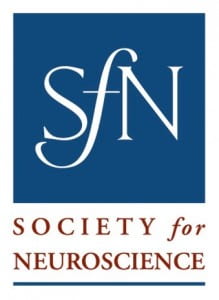 Senior graduate student Jennifer Tuscher is a recipient of a 2016 Society for Neuroscience Trainee Professional Development Award. This very selective award provides generous travel support for the SfN annual meeting. As a recipient of the award, Jen will present her poster in the Trainee Professional Development Award Poster Session at the annual meeting to be held in San Diego in November. Congratulations Jen!
Senior graduate student Jennifer Tuscher is a recipient of a 2016 Society for Neuroscience Trainee Professional Development Award. This very selective award provides generous travel support for the SfN annual meeting. As a recipient of the award, Jen will present her poster in the Trainee Professional Development Award Poster Session at the annual meeting to be held in San Diego in November. Congratulations Jen!
Undergrad Wasef Mahmoud presents her summer work
 Incoming undergraduate Wasef Mahmoud recently presented a poster on the lab’s approach to understanding the molecular mechanisms through which estradiol enhances memory consolidation. Wasef participated in UWM’s UR@UWM summer program, a 4-week research program for new undergraduates interested in research. Wasef and her fellow students presented their summer work to their fellow students, mentors, and families on August 5, 2016.
Incoming undergraduate Wasef Mahmoud recently presented a poster on the lab’s approach to understanding the molecular mechanisms through which estradiol enhances memory consolidation. Wasef participated in UWM’s UR@UWM summer program, a 4-week research program for new undergraduates interested in research. Wasef and her fellow students presented their summer work to their fellow students, mentors, and families on August 5, 2016.
Dr. Frick presents at the OSSD meeting in Philadelphia
 On May 26, Dr. Frick spoke about the effects of estradiol on memory and cell signaling in male and female mice at the Organization for the Study of Sex Differences annual meeting in Philadelphia. The symposium was chaired by Jill Goldstein and Emily Jacobs of Harvard Medical School, who also spoke. John Morrison of the University of California at Davis also presented his work in
On May 26, Dr. Frick spoke about the effects of estradiol on memory and cell signaling in male and female mice at the Organization for the Study of Sex Differences annual meeting in Philadelphia. The symposium was chaired by Jill Goldstein and Emily Jacobs of Harvard Medical School, who also spoke. John Morrison of the University of California at Davis also presented his work in
symposium.
Jaekyoon Kim publishes new paper in the Journal of Neuroscience
Fifth-year graduate student Jaekyoon Kim is the first-author of a new study in the Journal of Neuroscience (Kim et al., 2016, J Neurosci, 36(11):3309-3321) that examined the role of the membrane estrogen receptor G-protein-coupled estrogen receptor (GPER) in mediating the memory-enhancing effects of estradiol in ovariectomized female mice. Our previous work showed that activation of the canonical intracellular estrogen receptors, ERα and ERβ, in the dorsal hippocampus mimics the effects of dorsal hippocampal estradiol infusion on memory; like estradiol, agonists of ERα and ERβ enhance object recognition and spatial memory by increasing dorsal hippocampal ERK phosphorylation. Our new paper demonstrates that although activation of GPER in the dorsal hippocampus also enhances object recognition and spatial memory, it does so by triggering c-Jun N-terminal kinase (JNK) signaling rather than ERK signaling. Moreover, the ability of estradiol to enhance hippocampal memory was not dependent on either JNK or GPER activation, indicating that estradiol and GPER independently regulate hippocampal memory. These data suggest the intriguing conclusion that GPER does not function as an estrogen receptor in the dorsal hippocampus to regulate memory consolidation.
Jen Tuscher publishes new paper in the Journal of Neuroscience
Senior graduate student Jen Tuscher is the first author on a new paper in the Journal of Neuroscience (Tuscher et al., 2016, J Neurosci, 36(5):1483-1489), published with collaborators Maya Frankfurt (Hofstra North Shore-LIJ School of Medicine) and Victoria Luine (Hunter College). The paper examined the involvement of dorsal hippocampal extracellular signal-regulated kinase (ERK) and mammalian target of rapamycin (mTOR) signaling mechanisms in estrogenic regulation of dendritic spine density in the hippocampus and medial prefrontal cortex. Our lab previously showed that activation of ERK and mTOR in the dorsal hippocampus is necessary for estradiol to enhance spatial memory and object recognition in ovariectomized female mice. In this new paper, we first found that dorsal hippocampal infusion of estradiol selectively increases dendritic spine density not only in the dorsal hippocampus, but also in the prefrontal cortex, suggesting that estrogenic regulation of the hippocampus influences prefrontal spinogenesis. Next, we demonstrated that activation of ERK or mTOR signaling in the dorsal hippocampus is necessary for estradiol to increase dendritic spine density in both the hippocampus and prefrontal cortex. Thus, this study is the first to show that cell signaling regulates estradiol-induced spine formation in the dorsal hippocampus, and that this hippocampal spine formation drives spinogenesis in the prefrontal cortex.
Jen Tuscher publishes new paper in Hormones and Behavior
Jen Tuscher is the first author on a new paper in Hormones and Behavior (Tuscher et al., 2016, Horm Behav, 83:60-67), published in collaboration with Luke Remage-Healey and his students at UMass Amherst. This study presents the first evidence that 17β-estradiol synthesized within the dorsal hippocampus is necessary for hippocampus-dependent memory consolidation in rodents. Although much evidence suggests that estradiol regulates hippocampal memory formation, the beneficial effects of estradiol on memory are generally attributed to ovarian-synthesized estradiol. However, this new study shows that dorsal hippocampal estradiol synthesis is necessary for both object recognition and spatial memory consolidation in ovariectomized female mice. As such, this work provides important new insights into the mechanisms underlying estrogenic regulation of cognitive function in rodents.
Dr. Frick presents the lab’s research at the IBNS meeting in Budapest
 On June 8, Dr. Frick spoke about the lab’s work at the International Behavioral Neuroscience Meeting in Budapest, Hungary. Her talk was a part of a symposium entitled, “Sex differences in the brain: Implications for behavioral and biomedical research”. Other symposium speakers included Elena Choleris (Chair), Liisa Galea, and Farida Sohrabji.
On June 8, Dr. Frick spoke about the lab’s work at the International Behavioral Neuroscience Meeting in Budapest, Hungary. Her talk was a part of a symposium entitled, “Sex differences in the brain: Implications for behavioral and biomedical research”. Other symposium speakers included Elena Choleris (Chair), Liisa Galea, and Farida Sohrabji.